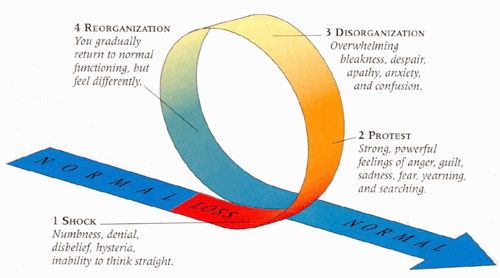Bereavement and Loss
The following is reproduced with permission from DK Publishing, Inc. www.dk.com
"It is difficult to come to terms with the feelings of devastation and total loss. Some days I don't feel too bad, but other days I feel I cannot go on."
Bereavement means "the loss of something valued." Grieving is a process of adjusting to that loss and is universally recognized across all cultures. The process of grieving usually occurs when the loss involves a death, but it can also be applied to other situations, including the breakup of a relationship or divorce, loss of a job, or coming to terms with the loss of health through an illness or disability. Research into comparative levels of stress connected with important life events shows that the death of a spouse is regarded as the most stressful event. Grieving is more difficult if the death is sudden or violent, or if the relationship was very close or one in which one or both partners were very dependent. When you experience a serious loss of someone close, you can experience the following four recognized stages of grief, each of which is accompanied by a range of different emotions:
Stage One: Shock The reality of the loss often takes time to sink in. Your initial reactions may vary from numbness, denial, disbelief, and hysteria, to not being able to think straight. These are all natural emotions that cushion you against the loss and allow you to experience it more slowly and cope with it better in the short term.
Stage Two: Protest At this stage, it is normal to protest that the loss cannot be real, even though you are being confronted with evidence that it is. As you struggle between denying and eventually accepting the reality of what has happened, you experience waves of strong and powerful feelings, such as anger, guilt, sadness, fear, yearning, and searching.
Stage Three: Disorganization This is the stage when the reality of the loss is only too real. You are likely to experience overwhelming feelings of bleakness, despair, apathy, anxiety, and confusion. You may feel that this depression could go on forever and that there is no way out.
Stage Four: Reorganization You begin to rebuild your life and acquire a greater balance. At last you are able to choose to remember happier times. Gradually you return to previous functioning, but often with changed values and new meaning in life.

Face The Pain
Grieving, though painful, is a natural process that must be acknowledged and worked through. Some people will wrongly try to avoid that pain by keeping themselves very busy or burying themselves in work. Other people might defend themselves against the pain by saying to themselves, "I have to be strong for everybody else" or "It's no use crying." The period of grieving cannot be hurried and may vary from days to weeks, months, or even years. Even when you feel you are over it, you must be prepared for occasional setbacks, perhaps when you hear a particular piece of music, smell a certain scent, or remember a shared anniversary.
It is understandable to want to spend time alone, but it does not help to become too isolated. Talking and listening are important throughout all stages of grief, but it is quite usual for friends and acquaintances to feel embarrassed and not know what to say. When you are ready, approach your friends and say, "I need to talk" or "I need some practical help." There will be days when you prefer not to talk about it. When this happens, it is best just to be honest and explain your feelings to other people.
Come to Terms With Your Grief
- Accept The Loss: It is natural to protect yourself from the full impact of the loss by holding on to the deceased's belongings. Although it may take time, being able to release those possessions is a positive sign of acceptance and reorganization.
- Feel The Pain: Recognize and experience your emotions. Crying helps, since it allows painful feelings to be expressed.
- Talk About It: Talking about the loss and reminiscing helps you to accept the situation. Expressing regrets, fears, and anger is helpful. Do not take the attitude that "it doesn't help to rake it up."
- Take One Day At a Time: Do not try to sort out everything at once. Grieving takes as long as it takes - there are no fixed time limits and it cannot be hurried.
- Take Care Of Yourself: Get plenty of rest, eat well, take time to retreat, and time to talk. Try not to become isolated but seek out social support.
- Adapt To Change: This may mean taking on a new role, learning new skills, or learning how to live on your own.
- Let Go: When you are ready, let go. This does not mean forget.
©Powell,Trevor. 1997. Free Yourself From Harmful Stress. New York, NY:DK Publishing, Inc. www.dk.com
Last Modified: Friday, 17-Nov-2006 09:17:51 EST
